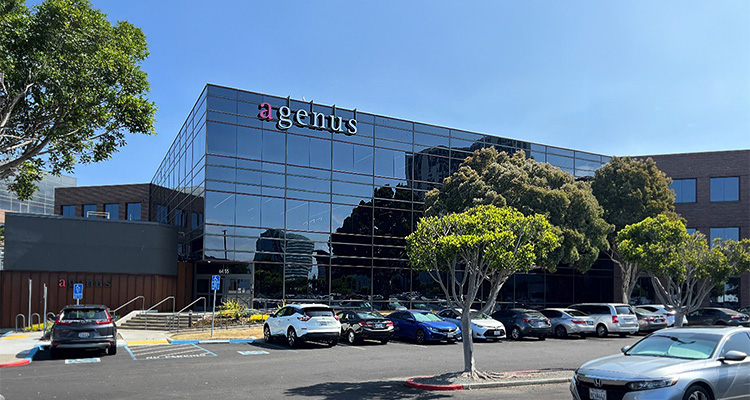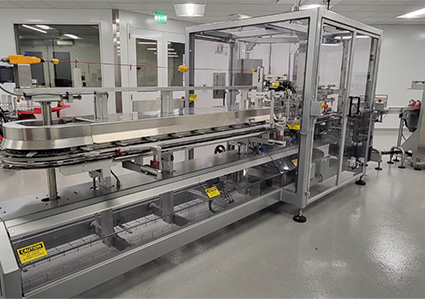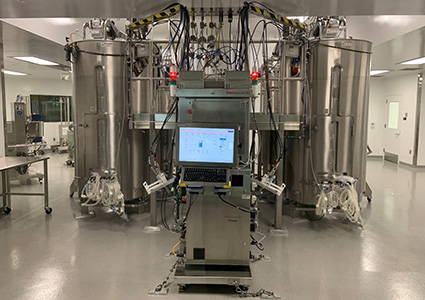
Harnessing the power of the immune system, Agenus Bio leads the charge in immuno-oncology
For nearly 30 years, Agenus Bio has been saving lives with its innovative immuno-oncology therapies and solutions. As one of the first researchers to use immunotherapy to fight cancer, the company’s journey has been marked by innovation and a commitment to improving patient outcomes. As Chief Manufacturing Officer, Alfred Dadson, begins: “Agenus Bio is a pioneering biotechnology company that has been in the forefront of immunotherapy since it was founded in 1994. We harness the power of the human immune system to fight cancer cells. As one of the first companies in the industrialized immunotherapy sector, we’ve built our business on an extensive pipeline of truly innovative therapies.

“Our therapies are designed to target key mechanisms of immunization in tumors. The journey began with groundbreaking work in cancer vaccines and adjuvants. Our most notable accomplishment from the early days is the QS-21 Stimulon, which is now a component of several FDA approved vaccines. Today, we are a leader in immuno-oncology, a type of oncology that specifically develops treatments using the immune system. A prime example of this work is our next generation CTLA-4 antibody, known as Botensilimab. This breakthrough therapy has demonstrated unprecedented activity in traditionally difficult to treat cancers. Our work continues to offer new hope to patients who have exhausted all their other options.
“We currently have 13 compounds in our pipeline, including two novel compounds, Balstilimab, an anti-PD-1, and Botensilimab. These compounds are advancing toward commercialization, and we are also working on several other promising developments,” Alfred explains. “Beyond these, Agenus Bio collaborates with its sister subsidiaries, MiNK Therapeutics (adoptive cell therapies) and SaponiQx (adjuvants and vaccines). We work closely as part of a broader immunotherapy network, providing cell therapy and adjuvants, some of which are still in development.”
Using a sophisticated operational network, Agenus Bio can efficiently manage its entire production process, as Alfred details: “Our global infrastructure spans across three strategic locations, each playing a vital role in our mission. Our site in Cambridge, UK, serves as our discovery facility and engineering hub. We then have our headquarters in Lexington, MA, where we drive our innovation initiatives. Finally, our California facility is complete with end-to-end capabilities for state-of-the-art manufacturing. Here, we hold all our clinical trials. This integrated approach allows us to efficiently shepherd our immunotherapies from initial concepts, all the way through to development and production.
“Our development pipeline starts with our cutting-edge research. We have a strategy that’s built on the foundation of innovation, and existing medical applications of immunotherapy. Our focus is on developing transformative treatments that significantly improve patient outcomes, across a broad spectrum of cancer types.
“Once the research has been refined to the point that it can be condensed down to a single therapy or treatment, it will move down the pipeline to our Discovery Hub. Here, new compounds, as well as compounds going through their second or third round of development, will be passed on to the specialists in our UK facility. Here, they undertake a process called cell line development. This is essentially testing the compound’s reaction to cancer cells. These early activities establish the viability of the compound, before it is passed on again to the California facility for process development and manufacturing to generate clinical trial materials. In its newest facility located in Emeryville, CA, Agenus Bio has streamlined its operations for production in-house, from drug substance preparation of materials for our human trials.”
 For Agenus Bio, research and development is a never-ending process. Always aiming to improve the lives of as many patients as possible, the company is currently testing its latest drug on a variety of different cancers: “We are currently in the second phase of our clinical trials, and the results so far are giving multiple indications that they could be used to successfully treat a variety of colorectal cancers. However, this drug is also being applied to pancreatic, melanomas, and other notoriously hard to treat cancers. We want our therapies to be as widely applicable as possible, so that we can provide a benefit to patients with some of the most difficult diagnoses imaginable,” Alfred affirms.
For Agenus Bio, research and development is a never-ending process. Always aiming to improve the lives of as many patients as possible, the company is currently testing its latest drug on a variety of different cancers: “We are currently in the second phase of our clinical trials, and the results so far are giving multiple indications that they could be used to successfully treat a variety of colorectal cancers. However, this drug is also being applied to pancreatic, melanomas, and other notoriously hard to treat cancers. We want our therapies to be as widely applicable as possible, so that we can provide a benefit to patients with some of the most difficult diagnoses imaginable,” Alfred affirms.
Known for its ability to produce diverse antibody solutions that tackle even the hardest to treat cancers, the company has recently invested in its all-new Californian facility that uses cutting-edge technology to take its research even further: “Commercialization is the key next step in making our therapies more widely available. With our new facility in California, we’re able to accelerate these efforts. It’s a brand-new, industry leading, end-to-end commercial unit, complete with a fully integrated CGMP facility for the development and manufacturing of biologics. From this facility, we’re able to manufacture our therapies in greater quantities, with higher levels of efficiency. The space itself is an impressive 83,000 sq ft, and every inch is used as strategically as possible.
“We’re aiming to create an entirely self-sufficient facility. With our best-in-class equipment, and higher rates of production, we can manufacture biological therapies and solutions at a larger scale, and with greater efficiency, ensuring faster access for patients in need.
“This facility allows us to go from cell line development to cell engineering, all the way through to drug product production and commercialization. Our in-house capabilities even extend to packaging, labelling, sterilization, aggregation, warehousing, and distribution. Further, it feeds back into the development pipeline, by providing a quicker turnaround on trial outcomes. We’re always keeping the patient in mind — we want to deliver the drugs to them as quickly, and as cost efficiently as possible.
“The facility’s advanced systems, including four 2,000L upstream production bioreactors, support the company’s own needs and those smaller partners. In our industry, researchers will often need to bring their products to clinical trials more rapidly. Since we have some of the most leading-edge equipment, it’s important that we make space for and support other medical researchers when necessary, furthering the goal of improving cancer treatment globally.”
Driven by its mission to provide innovative solutions to previously untreatable conditions, Agenus Bio continues its work on cross-disciplinary solutions: “We’re always researching and developing treatments for different cancer modalities, so that we’re able to bring curative solutions to patients in need. The antibody division of our operation is working on several therapies that are still under development. We also have the cell therapy unit, where we have several products in the pipeline such as AgenT-797 and MinK-215, including a more potent adjuvant QS-21 Stimulon also from our SaponiQx subsidiary. Our overarching goal is to leverage all these capabilities under one umbrella, seeking a broader solution that combines different scientific approaches.
“The next evolution of our business will be in combination therapies. Our ambition is that these drugs will be effective in addressing a variety of cancer types. As the company continues to grow, we’re looking to expand beyond our Emeryville facility, using some of our greenfield land we have out in Vacaville, CA. This space holds a lot of potential, and it’s exciting to think where these technologies and ideas could take us. We can build additional capabilities into our pipeline, and, from there, the sky’s the limit,” Alfred concludes.